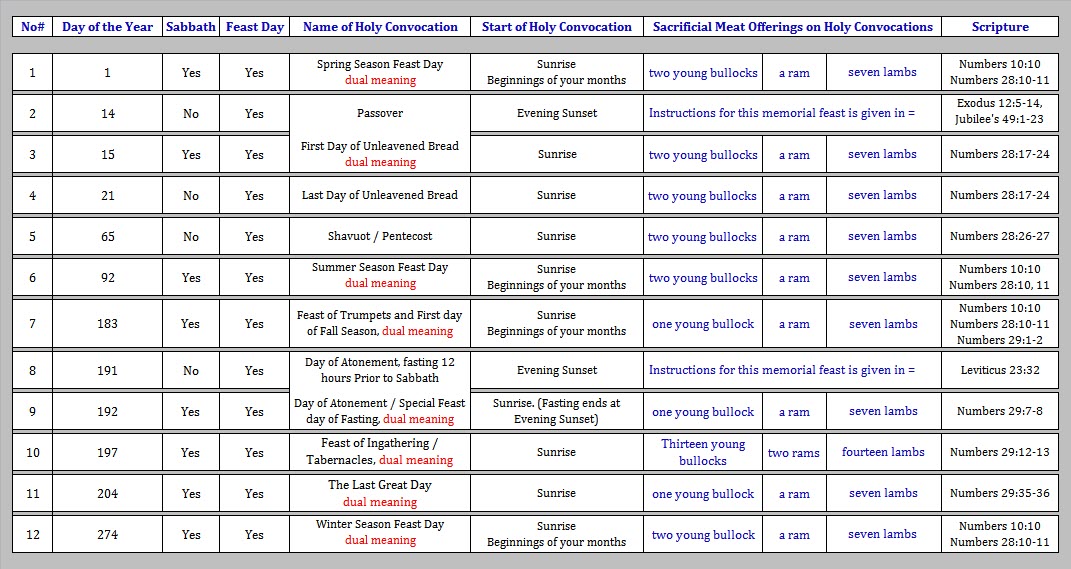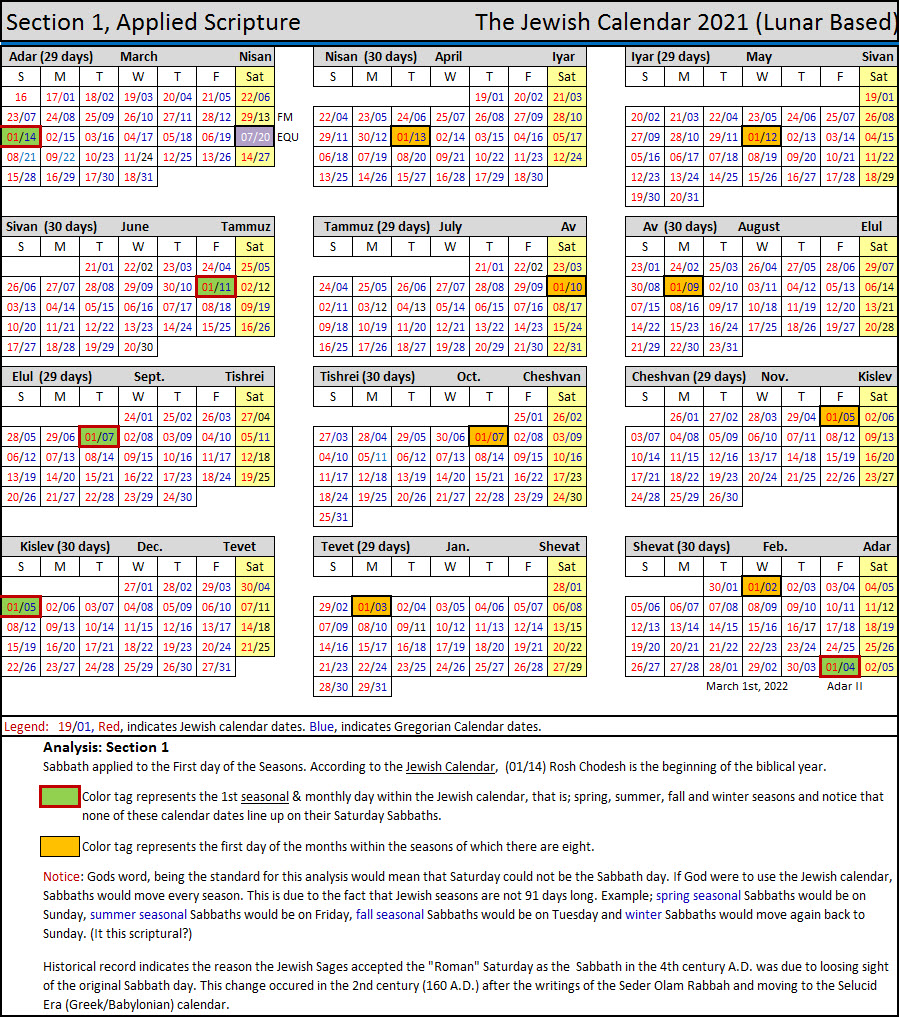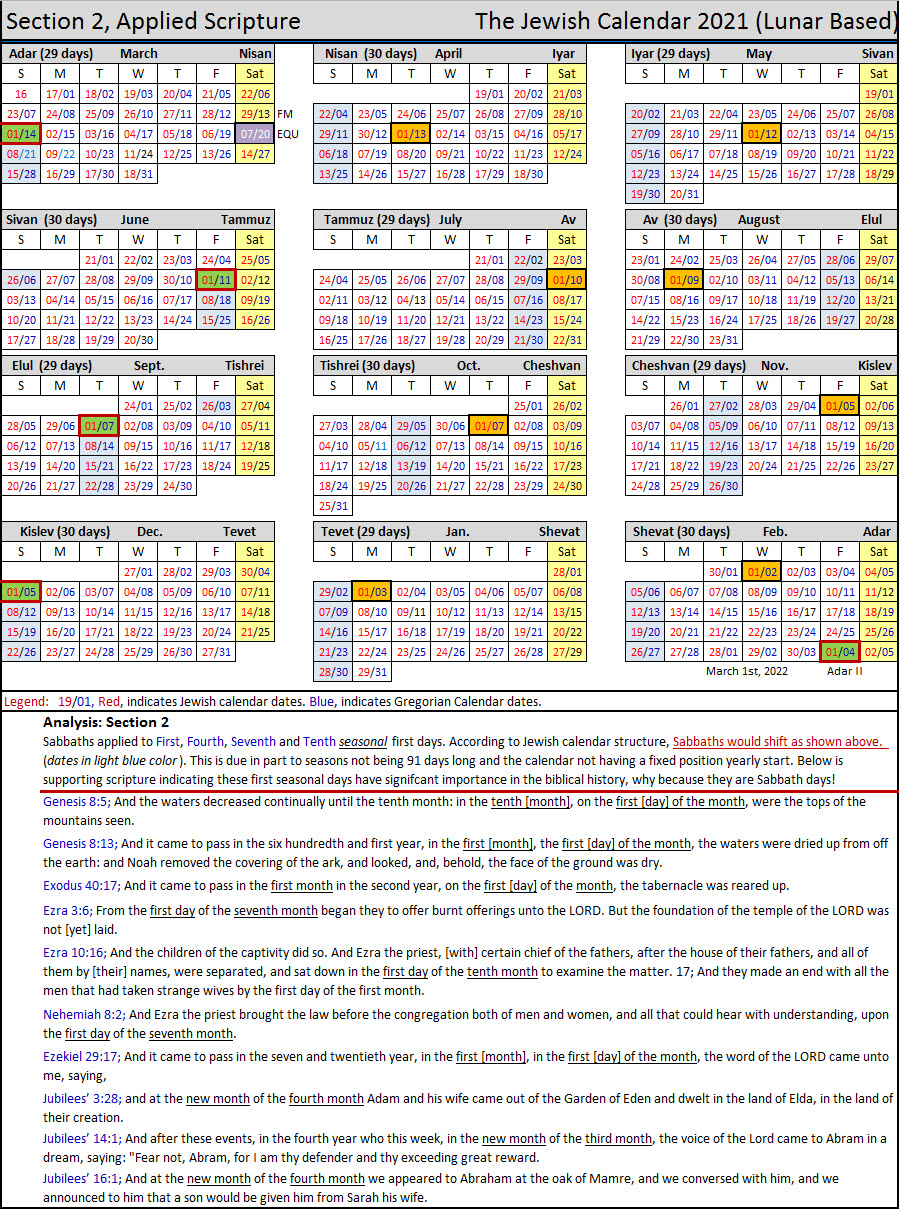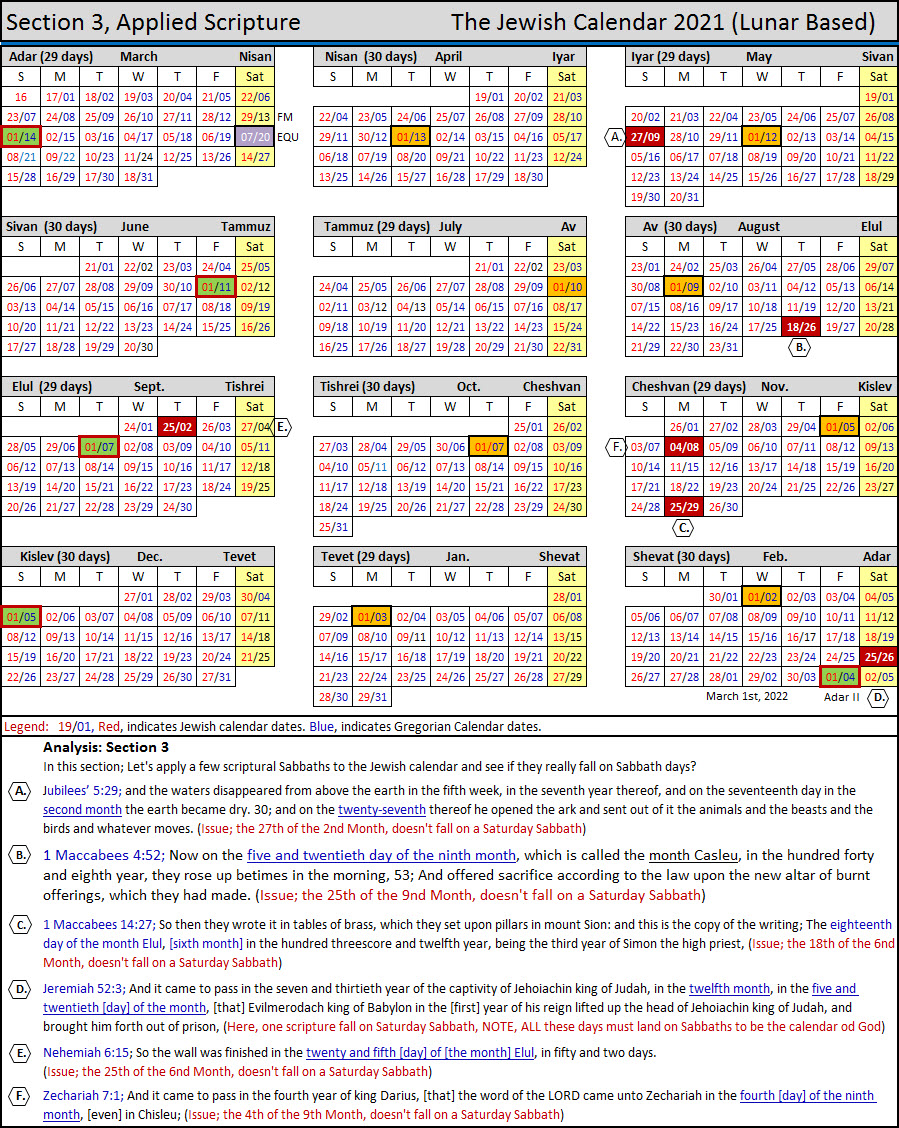 Below is the biblical solar calendar synopsis outline along with its comparison pages to the Jewish calendar of today. This page serves as a quicker (visual) answer to differences in calendar structure. The outline and understanding you are about to learn can be applied to any man-made calendar. A branch of peace and understanding is extended to all who seek information regarding Alohym's solar calendar. The time for fighting about God's calendar must come to an end, a time of humility and truth through research and revelation by the Holy Spirit, revealing new truth to all who seek our Heavenly Father and His Son Yahusha, Christ.
Below is the biblical solar calendar synopsis outline along with its comparison pages to the Jewish calendar of today. This page serves as a quicker (visual) answer to differences in calendar structure. The outline and understanding you are about to learn can be applied to any man-made calendar. A branch of peace and understanding is extended to all who seek information regarding Alohym's solar calendar. The time for fighting about God's calendar must come to an end, a time of humility and truth through research and revelation by the Holy Spirit, revealing new truth to all who seek our Heavenly Father and His Son Yahusha, Christ.
The Biblical Calendar Synopsis
(NOTE; Please review the information & Analysis photos below. Once you understand the truth concerning this vital information, you will be able to apply it to ANY calendar.
(Important), the synopsis which you are about to read is based on the 1769 Oxford Edition, King James Bible of which contained 80 books. In 1885 A.D., 14 biblical books were removed “officially” from the protestant bible authorized by the British Crown who controls the Copyrights. This synopsis also included the Books of Enoch and Jubilees, which were lost until the beginning of the 19th Century in Ethiopia. Within the finding of the Dead Sea scrolls, 16 chapters of the Hebrew Book Jubilees’ were found and through language analysis certified the Ge’ez (Ethiopic) and Hebrew versions as a match. It also needs to be noted; that the LXX Septuagint Bible translated from Hebrew to Greek also contained the Apocrypha writings of which was accepted by the first-century church. Based on all the above historical data, here are the findings and structure of the true biblical calendar.
- The biblical calendar is fixed positioned, i.e. it never moves. This means the Gregorian 7-day shift cycle revolves around God's beginning calendar Sabbath due to Equinox’s institution. (Understanding the Equinox & Shift cycle, Chapter 5)
- The biblical calendar begins the day after the Equilux; that is, the Equilux being the 364th day of the calendar year and the last intercalary (91st) day of the winter season. (Understanding the Equilux, Chapter 6)
- The biblical calendar is 364 days in length. (It is the Gregorian Calendar that moves not Gods) (Understanding the Calendar structure, Chapter 6)
- The biblical seasons are 91 days long, 90 monthly calendar dates, and 1 intercalary day, day 91. There are 4 of these 91st-day markers which reside at the end of each season. These days are counted in the overall reckoning of a year, 360 monthly calendar days and 4 intercalary days making a total of 364 total yearly days. These 91st intercalary days always fall on the 6th (preparation) day of the week. It is a preparation day before the 1st seasonal Sabbath. These Sabbaths are called “new months” Chodesh, not “new moons” as mistranslated into English. Note; in accordance with the Book of Enoch, these 4 intercalary days are not recognized as a monthly calendar date, and since they fall on the 6th day of the week, they cannot be mistaken as a Sabbath day. (Understanding the Calendar structure, Chapter 6)
- All 4 Seasons mirror one another with 3 months and 13 weekly Sabbaths.
- There are 52 weekly Sabbaths of which there are 8 dual meaning Sabbaths, which is a Weekly and Festival Sabbath on the same day. The biblical calendar only has 53 Sabbaths in a yearly cycle. The only weekly Sabbath exception is the Day of Atonement which always falls on a Saturday. (Gregorian weekly dating) (Understanding the Calendar structure, Chapter 6)
- The biblical calendar Sabbath always falls on Thursday. It always begins and ends at Sunrise, the renewing of the day!
- The spring and fall seasons practically mirror each other with the exact festival counts. Whereas the summer and winter seasons mirror themselves.
It is apparent through biblical research that God never intended man to observe more than 53 Sabbaths in his yearly cycle. The biblical calendar is not subject to man’s traditions and calculations such as Sidereal time and the Equinox which are all works of men. It is the only calendar that never moves and never changes, just like God himself, fixed and steady.
The next step is revealing the yearly sacrificial law calendar. The foundation of the biblical calendar is based on sacrificial law given to Moses and the patriarchs from Yahuah (the LORD God) pre-incarnate Christ. Notice, there are actually 12 Solemn days of which 4 are holy convocations (non-Sabbaths) and 8 dual meaning Sabbaths which are weekly and yearly festival Sabbaths together on the same day.

Now that you have reviewed the sacrificial law calendar, the comparison, analysis, and calendar review are posted below. We have chosen three categories in which to test the Jewish (rabbinical) calendars which many claims to be God's calendar. These sections are:
- Scripture confirming, "New Months", are weekly seasonal Sabbaths according to the Sacrificial Law Calendar.
- Scripture confirming, "first, fourth, seventh, and tenth months" are the first day of the "New Seasonal Month".
- Scripture confirming, "Sabbaths", that line up with the biblical calendar.
Section 1; (Click to Download the complete Scriptural Section Comparison) updated 6/19/21
Scripture confirming, "New Months", are weekly seasonal Sabbaths according to the Sacrificial Law Calendar. (With reference to Numbers 10:10, 28:9, 10, and 11) Please review the 12 scriptures below Section 1, Applied Scripture photo which confirms these facts and applies to this section.

(Note) Below, supporting scripture which indicate "new month", seasonal first days are not only solemn appointed time to God, they are also weekly Sabbaths.
- Psalms 81:3; Blow up the trumpet in new months in the appointed day, our solemn feast day.
- 1 Chronicles 23:31; And to all burnt sacrifices unto the LORD to sabbaths, to new months, and to set feasts in number, according to the order commanded unto them, continually before the LORD:
- 2 Chronicles 31:3; and assign the king's portion from his substance for the burnt offerings, for the morning and evening burnt offerings, and the burnt offerings for sabbaths and for new months, and for appointed feasts, as [it is] written in the law of the LORD.
- 2 Chronicles 2:4; Behold, I build an house to the name of the LORD my God, to dedicate [it] to him, [and] to burn before him sweet incense, and for the continual shewbread, and for the burnt offerings morning and evening, on sabbaths and to new months, and to appointed feasts of the LORD our God perpetual, on Israel.
- 2 Chronicles 8:13; Even after a certain rate every day, offering according to the commandment of Moses, on the sabbaths, and on the new months, and on the solemn feasts, three times in the year, [even] in the feast of unleavened bread, and in the feast of weeks, and in the feast of tabernacles.
- Nehemiah 10:33; For the arranged shewbread, and for continual meat offering, and for continual burnt offering the sabbaths the new months, for appointed feasts, and for holiness and for sin offerings to make an atonement for Israel, and all for the work of the house of our God.
- Ezra 3:5; And afterward [offered] the continual burnt offering, both of the new months, and of all the set feasts of the LORD that were consecrated, and of every one that willingly offered a freewill offering unto the LORD.
- Isaiah 66:23; And it shall come to pass, [that] from one new month to another and from one sabbath to another, shall all flesh come to worship before me, saith the LORD.
(Note; here it clearly states that we are to worship on new months, which are weekly Sabbaths, which must line up on the same day!) - Ezekiel 46:1; Thus saith the Lord GOD; The gate of the inner court that looketh toward the east shall be shut the six working days; but on the sabbath it shall be opened, and in the day of the new months it shall be opened. (Note; the gates are open for worship only on new months, and Sabbaths day. There again Sabbaths and New Months must line up on the same day!)
- Ezekiel 46:3; Likewise the people of the land shall worship at the door of this gate before the LORD in sabbaths and in new months. v4; And the burnt offering that the prince shall offer unto the LORD in the sabbath day [shall be] six lambs without blemish, and a ram without blemish. v5; And the meat offering [shall be] an ephah for a ram, and the meat offering for the lambs as he shall be able to give, and an hin of oil to an ephah. v6; And in the day of the new month [it shall be] a young bullock without blemish, and six lambs, and a ram: they shall be without blemish.
(Note; this scripture takes us back to Numbers 28; 9, 10, and 11 that new [seasonal] months are important Sabbaths day to God. - Hosea 2:11; I will also cause all her delight to cease, her feast days, her new months, and her sabbaths, and all her solemn feasts.
- Colossians 2:16; Let no man therefore judge you in meat, or in drink, or in respect of an holy day, or of the new months, or of the sabbath[days]:


